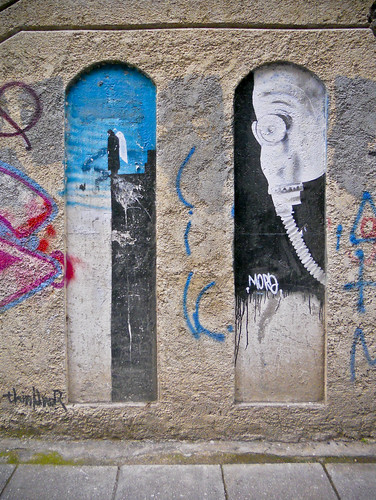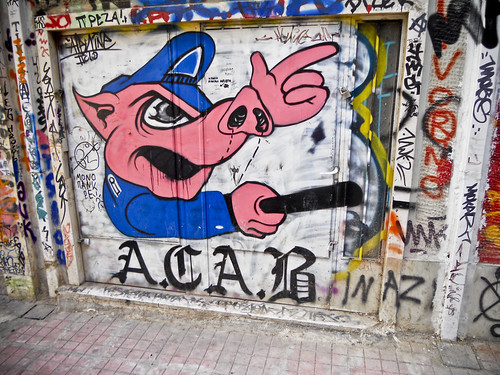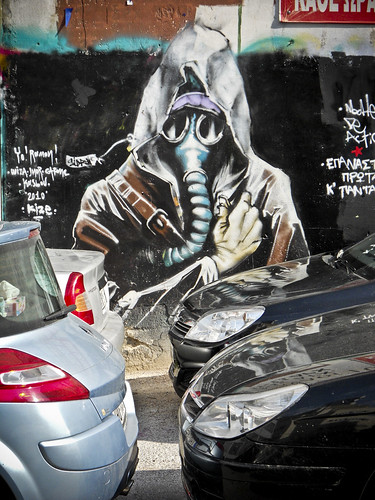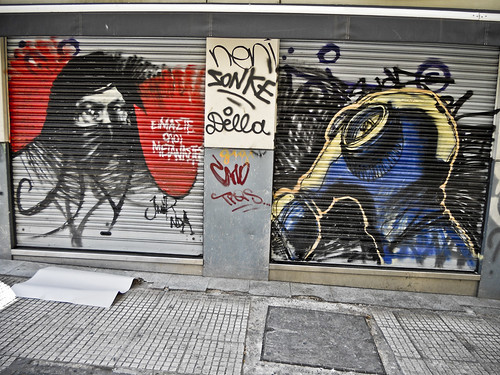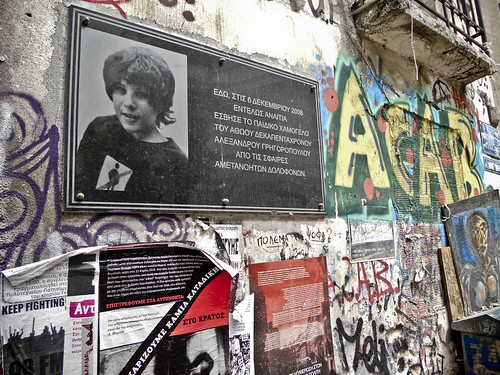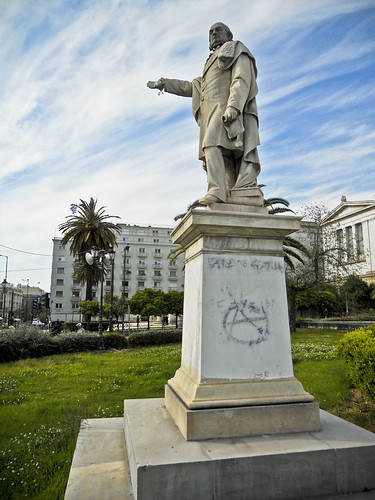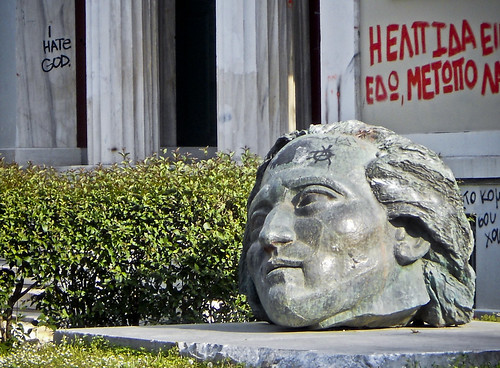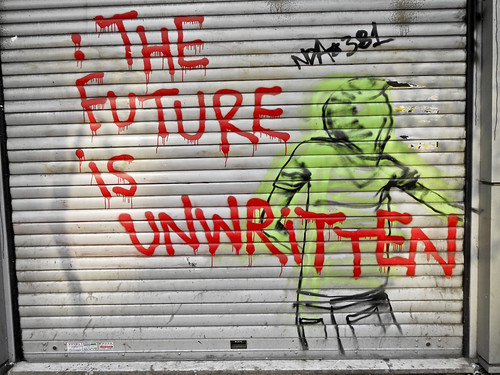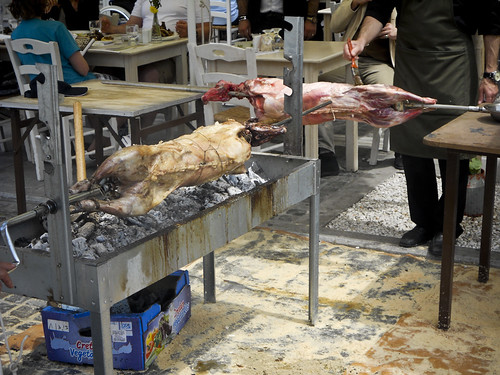By anyone's standards there are a lot of anarchists in Athens. Upwards of 5,000 in fact. Every single one of these people knows they are a small minority compared to the city's overall population. For any drastic changes to society that they hope for, in fact work towards, they know that their ideas need to spread. When the country exploded into riots back in 2008, a huge portion of society rose up against the police and the government. Back then the economy was much stronger than it is today.
Right now the Greek government is being compelled by the European Union and the International Monetary Fund (IMF) to enact a number of 'adjustments' in order to get the country's finances back in order. Workers here are taking huge pay cuts, losing benefits, pensions are being plundered, and social programs are being slashed. The people here are also facing devastating rising costs. Taxes are up, gasoline has doubled in price over the past year, and the price of food is rising. The EU has asked the Greek population to 'tighten their belts,' as the faltering economy drags the value of the Euro down.
"We'll tighten the belt around your fucking neck" is scrawled across the a building in Athens. A fitting response, considering all of the pain the people here have been feeling. Perhaps it was an anarchist, but perhaps not. As you might imagine, there is a considerable amount discontent with the government. There have been huge, violent demonstrations in response to the economic crisis over the past few months as anger has started to boil over into rage.
Residents from the Athenian suburb of Keratea have been fighting off government plans to start construction of a landfill, which is an IMF mandated infrastructural project. Locals contend that there will be massive environmental damage, contamination of the local groundwater, devastation to local archeological sites, and simply don't want to be a toilet for Athens. The plans went forward without input or consent of the locals, and as a result the town erupted into a full-fledged rebellion. When riot police were sent in from the capital to enforce the plans, the locals made a decision that was obvious to them: they called the anarchists. This led to a powerful alliance between experienced militant demonstrators and an infuriated community. Together over the next four and a half months barricades were erected, street battles were fought and won, police stations were attacked, and construction was successfully prevented. Less than two weeks ago, the occupying army of Athenian riot cops abandoned the city. While the official plans for construction are still in place, most people believe they are unwilling to carry them out.
The state is afraid of the Mayday demonstration. Just yesterday the police carried out a publicity stunt and arrested three anarchists, claiming they had something to do with the firebombing of a bank that took place one year ago a few days after Mayday, which made international headlines as three bank employees were killed. After the news picked up the story last night, the three were released and told to return for questioning on May 5th, the anniversary of the deaths. Most anarchists here believe this operation was carried out solely for the purpose of scaring people from attending the march. Everyone already knows it will be small this year, perhaps only a few thousand, because Mayday falls on a Sunday and there will be less people in Athens.
One thing is certain about this demonstration. Anarchists and anti-authoritarians will be there in droves. A group called "High School Students With Memory" has put out a call for demonstrations. There was an entire generation of 14 and 15 year-olds who cut their teeth street-fighting with police during the December 2008 riots, and these people are now young adults who feel that their future has been stolen from them. These students will march alongside thousands of anarchists, workers, and unemployed in a city where protests regularly turn violent. Mayday is just an appetizer for the feast that tens, perhaps hundreds, of thousands more will enjoy together on May 11th at the general strike. The police and the media will do everything they can to marginalize anarchists and shift the rage of the Greek people away from the government and towards one another. The bonds that have formed between anarchists and non-anarchists have been growing quickly over the past several years, and work is being done to make sure that the State's strategy of divide and conquer is transparent and ineffective. All of the pieces are in place for a confrontation that has the potential to drastically alter the future for capitalism in this region.
More photos...
Right now the Greek government is being compelled by the European Union and the International Monetary Fund (IMF) to enact a number of 'adjustments' in order to get the country's finances back in order. Workers here are taking huge pay cuts, losing benefits, pensions are being plundered, and social programs are being slashed. The people here are also facing devastating rising costs. Taxes are up, gasoline has doubled in price over the past year, and the price of food is rising. The EU has asked the Greek population to 'tighten their belts,' as the faltering economy drags the value of the Euro down.
"We'll tighten the belt around your fucking neck" is scrawled across the a building in Athens. A fitting response, considering all of the pain the people here have been feeling. Perhaps it was an anarchist, but perhaps not. As you might imagine, there is a considerable amount discontent with the government. There have been huge, violent demonstrations in response to the economic crisis over the past few months as anger has started to boil over into rage.
Residents from the Athenian suburb of Keratea have been fighting off government plans to start construction of a landfill, which is an IMF mandated infrastructural project. Locals contend that there will be massive environmental damage, contamination of the local groundwater, devastation to local archeological sites, and simply don't want to be a toilet for Athens. The plans went forward without input or consent of the locals, and as a result the town erupted into a full-fledged rebellion. When riot police were sent in from the capital to enforce the plans, the locals made a decision that was obvious to them: they called the anarchists. This led to a powerful alliance between experienced militant demonstrators and an infuriated community. Together over the next four and a half months barricades were erected, street battles were fought and won, police stations were attacked, and construction was successfully prevented. Less than two weeks ago, the occupying army of Athenian riot cops abandoned the city. While the official plans for construction are still in place, most people believe they are unwilling to carry them out.
The state is afraid of the Mayday demonstration. Just yesterday the police carried out a publicity stunt and arrested three anarchists, claiming they had something to do with the firebombing of a bank that took place one year ago a few days after Mayday, which made international headlines as three bank employees were killed. After the news picked up the story last night, the three were released and told to return for questioning on May 5th, the anniversary of the deaths. Most anarchists here believe this operation was carried out solely for the purpose of scaring people from attending the march. Everyone already knows it will be small this year, perhaps only a few thousand, because Mayday falls on a Sunday and there will be less people in Athens.
One thing is certain about this demonstration. Anarchists and anti-authoritarians will be there in droves. A group called "High School Students With Memory" has put out a call for demonstrations. There was an entire generation of 14 and 15 year-olds who cut their teeth street-fighting with police during the December 2008 riots, and these people are now young adults who feel that their future has been stolen from them. These students will march alongside thousands of anarchists, workers, and unemployed in a city where protests regularly turn violent. Mayday is just an appetizer for the feast that tens, perhaps hundreds, of thousands more will enjoy together on May 11th at the general strike. The police and the media will do everything they can to marginalize anarchists and shift the rage of the Greek people away from the government and towards one another. The bonds that have formed between anarchists and non-anarchists have been growing quickly over the past several years, and work is being done to make sure that the State's strategy of divide and conquer is transparent and ineffective. All of the pieces are in place for a confrontation that has the potential to drastically alter the future for capitalism in this region.
More photos...

